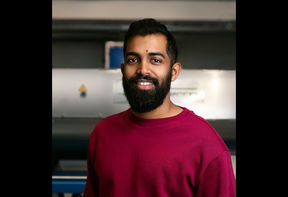Towards a sustainable packaging industry – Madhawa Basnayaka develops ecological and intelligent packaging

The rapidly growing packaging industry has an increasing need for products that enable the identification and tracing of packages as well as the monitoring of their internal conditions. The introduction of remote reading and intelligence into packaging also brings with it electronics parts made of plastic. In his doctoral research, Madhawa Basnayaka develops intelligent packaging solutions in which fossil-based materials are replaced by lignin-rich biomaterials.
‘I’m looking for solutions for a chip-free RFID tag which can be used to track packages and sense their conditions. This requires materials that are sensitive to changes in conditions such as humidity and temperature as well as any mechanical damages (crashes or handling errors) occuring during the supply chain to the package’, explains Basnayaka.
There are plenty of challenges: while an unlimited amount of data can be encoded in the electronic chip of an RFID tag, information on different conditions must now be collected using materials that are sensitive to them. Precise control of the sensitivity of materials is a key factor. Basnayaka accepts the challenges and is enthusiastic about his doctoral research which has a concrete goal: an intelligent packaging solution made of biodegradable materials.
‘There is demand for sustainable and intelligent packaging in many sectors, particularly in the transport of food, pharmaceutical and cosmetics products. The market is enormous.’
From Sri Lanka to Finland via Estonia
Despite his young age, Basnayaka has gained international work experience alongside his studies. He completed his bachelor’s studies in natural sciences at the University of Peradeniya in Sri Lanka, followed by work in university education and the textile sector.
Basnayaka graduated with a master’s degree from the University of Tartu, majoring in materials science and sustainable energetics. While studying in Estonia, he was kept busy by his work at the telecommunications company Ericsson, where he designed and tested electronic components, equipment and software.
‘In my doctoral research, I can combine my expertise in materials sciences and electronics. The multidisciplinary project at the Bioinnovation Center is exactly what I was looking for. The doctoral dissertation is a four-year journey facilitated by genuine motivation for the topic.’
Where will the road take you after the doctorate?
‘I could see myself as a team leader in industry.’
Basnayaka lived in Estonia for almost four years. He has also settled well into Finland.
‘I enjoy nature and the four seasons. I’m planning to start my Finnish studies soon. I have also studied Estonian, and the Finnish language seems to have a lot in common with it.’
Whenever Basnayaka has some time left over from his postgraduate studies and doctoral research, he does sports.
‘I play cricket and rugby in the local clubs. I also go to the gym. I want to keep myself busy, and sport is a good counterbalance to academic work.’
Text: Marjukka Puolakka
Aalto University Bioinnovation Center
To achieve human wellbeing in planetary boundaries, we need new sustainable solutions to wisely use our natural resources. The Bioinnovation Center especially focuses on innovations in sustainable bio-based materials, with special focus on textiles and packaging.

Read more news

Join a Unite! matchmaking event on forging new consortia for Horizon Europe applications
Calling researchers and industry partners to connect at a virtual matchmaking session designed to spark project collaborations for Horizon Europe funding. Registration deadline, 12 March.
Apply Now: Unite! Visiting Professorships at TU Graz
TU Graz, Austria, invites experienced postdoctoral researchers to apply for two fully funded visiting professorships. The deadline for expressions of interest is 20 February 2026, and the positions will begin on 1 October 2026.
Hanaholmen’s 50th anniversary exhibition lives on online – making the history of Finnish–Swedish cooperation accessible worldwide
MeMo Institute at Aalto University has produced a virtual 3D version of the anniversary exhibition of Hanaholmen.






